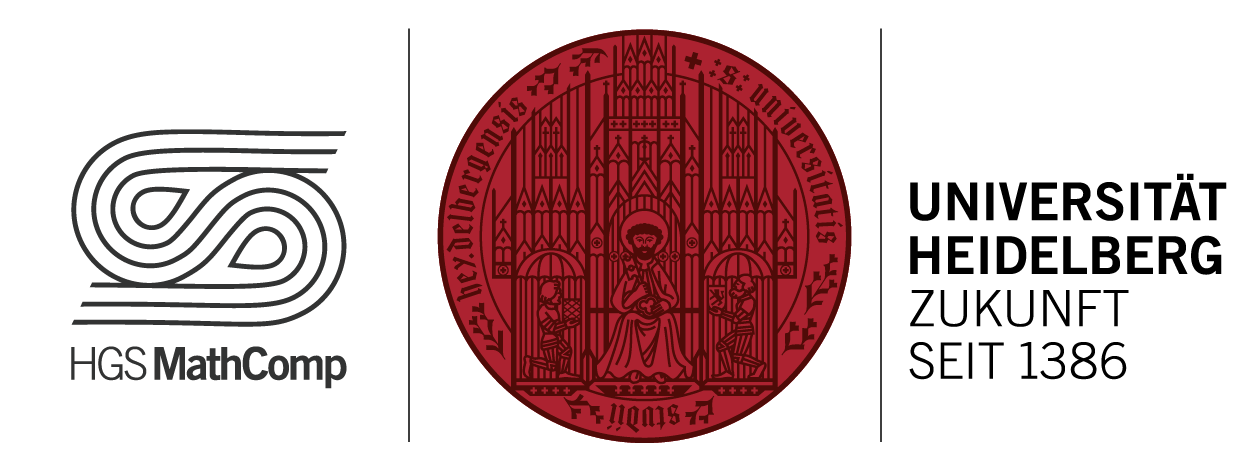
HGS MathComp - Where Methods Meet Applications
The Heidelberg Graduate School of Mathematical and Computational Methods for the Sciences (HGS MathComp) at Heidelberg University is one of the leading graduate schools in Germany focusing on the complex topic of Scientific Computing. Located in a vibrant research environment, the school offers a structured interdisciplinary education for PhD students. The program supports students in pursuing innovative PhD projects with a strong application-oriented focus, ranging from mathematics, computer science, bio/life-sciences, physics, and chemical engineering sciences to cultural heritage. A strong focus is put on the mathematical and computational foundations: the theoretical underpinnings and computational abstraction and conception.
HGS MathComp Principal Investigators are leading experts in their fields, working on projects that combine mathematical and computational methodology with topical research issues. Individual mentoring for PhD candidates and career development programs ensure that graduates are fully equipped to take up top positions in industry and academia.
Current Opportunities
4EU+ Joint DFH/UFA workshop on AI in Medicine: Optimised Trials with Machine Learning (Paris)
Deadline: April 30, 2024
Upcoming Events [see all...]
12:00 - 13:00
[ more ...]
Organizer: Scientific Software Center (SSC)
The RSE coffee hour aims to bring together RSEs at all career stages! Join us for a cup of coffee and chat about challenges and strategies for developing research software.
*Research Software Engineer (RSE) = someone who develops their own software as part of their
research
**https://ssciwr.github.io/lunch-time-python/
Organizer: HGS MathComp
The BlueSheet Meeting will be held online for all new members of HGS MathComp on April 30, 2024 between 14:00 - 15:00.
“Modeling of urban microclimate and mobility effects on mosquito abundance and vectorial competence”
14:50 - Hannah Weiser (Supervisor B. Höfle)
“It all starts with data – Improving machine learning-based point cloud algorithms for forest applications with synthetic training data generated by virtual laser scanning”
15:10 - Ronald Tabernig (Supervisor B. Höfle)
„Simulating laser scanning of dynamic virtual 3D scenes for improved 4D point cloud-based topographic change analysis“
15:30 - 10-minute break
15:40 - Niklas Reinhardt (Supervisor J. Zech)
“Domain Uncertainty Quantification”
16:00 - Marco Hübner (Supervisor L Maier-Hein)
“Spectral Image Synthesis for Training Intelligent Surgical Systems”
16:20 - Julian Niederer (Supervisor E. Kostina)
"Numerical Methods for Nonlinear Model Predictive Control for Control Problems with Blocks of Vanishing Constraints”
16:30 - 18:00
[ more ...]
Registration: Please register via this form
Organizer: MLAI
To help plan the catering, please register for free by clicking here. (Deadline: April 23, 2024)
Scientific Machine Learning is a joint initiative from STRUCTURES and IWR aimed at fostering interactions within and development of the local machine learning community. Its portal summarizes the many relevant events and news from across campus that would otherwise remain scattered across single institutions or fields. The goals of the MLAI platform align with the STRUCTURES Cluster of Excellence's objective of driving research into the fundamental understanding of current and future machine learning, and with IWR’s aim to leverage machine learning to enable the solution of long-standing problems in the natural and life sciences, the engineering sciences, as well as the humanities.
Further information and links:
MLAI homepage • Machine Learning Talks on Campus – Information service and mailing list • STRUCTURES Cluster of Excellence
Tobias Buck, Holger Fröning, Denis Schapiro
Science talks:
• William Oliver (Buck lab): Machine Learning for cosmological simulations
• Hendrik Borras (Fröning lab): Probabilistic Photonic Computing with Chaotic Light
• Miguel A. Ibarra Arellano (Schapiro lab): Finding broken cells with AI and computer vision

